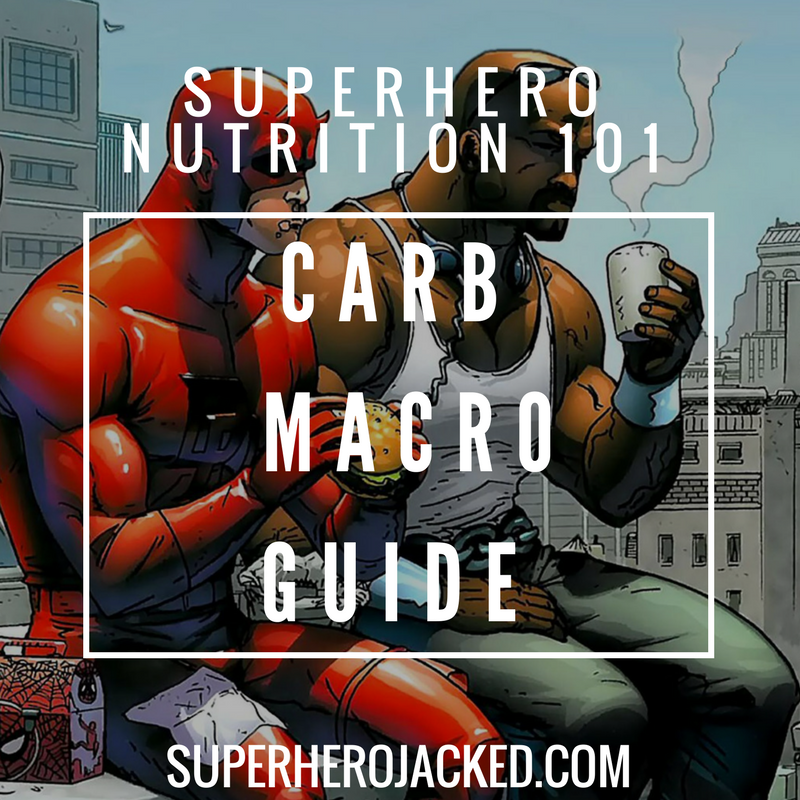Last updated on March 28th, 2020 at 11:11 am
 We’re taking things down to basics and covering what you need to know about macronutrients. Macronutrients, or macros for short, are nutrients that your body needs in large amounts. They also provide calories (energy) to help it run like a well-oiled machine on a day-to-day basis.
We’re taking things down to basics and covering what you need to know about macronutrients. Macronutrients, or macros for short, are nutrients that your body needs in large amounts. They also provide calories (energy) to help it run like a well-oiled machine on a day-to-day basis.
Beginners, this is especially for you, so take notes. Everyone else, feel free to enjoy this refresher as we cover what you need to know about proteins, carbs, and fats!
Carbohydrates
Promoters of low-carb or keto diets may cringe at the sight of carbohydrates, but they unknowingly consume them. Let’s set the record straight here, though: I am not talking about carbs in the form of chips, crackers, tortilla wraps, or fried potatoes. What I am referring to are carbs found in vegetables, fruits, nuts/seeds, roots, and, eating-style-permitted, legumes and rice.
Keep in mind that all of these foods contain varying amounts of carbohydrates. For example, ketogenic dieters may not be reaching for the nearest boil of fruit, but they’ll definitely be consuming leafy green vegetables like spinach, as well as zucchini, cauliflower, broccoli, and dairy, which does contain a small bit of carbs (read: small). On the flipside, vegans/vegetarians will naturally consume more, replacing carb-free foods like animal proteins with legumes, nuts/seeds, and grains (which all contain carbs). But at the end of the day, neither holds a candle to the copious amounts of processed foods found from modern diets, which are all made up of flour, sugars, and preservatives that spike blood sugar, manipulate hunger/satiety hormones, and send cravings off the roof.
So put your fears aside and consider the following benefits and functions of carbohydrates:
- Digestion (fiber-rich carbs are fuel for the beneficial bacteria in our intestinal tract, in turn supporting nutrient absorption, immunity, digestive health, balanced mood, and more benefits too numerous to mention)
- Fiber (aside from their digestive benefits- see above-, fiber also keeps you full, controls blood sugar levels, and lowers bad (LDL) cholesterol levels)
- Energy
- Better sleep
- Improved moods
- Antioxidants (the vast majority of these can be found in plants, and help the body deal with inflammation and damage from sunlight, pollutants, and stress)
There are a few different types of carbohydrates I’d like to briefly go over. Use this as your quick-sheet depending on your goals and dietary preferences:
Non-Starchy (FIBROUS) Carbs
The following foods may be low carb, but tend to have higher amounts of fiber and will vary in sugar content:
Found In: Fruits (green apples, berries, kiwi, grapefruit, avocado, olives, tomatoes, peppers, cucumber, zucchini, lemons/limes), Leafy Greens, Cruciferous Vegetables, Herbs/Spices, Squash, Mushrooms, Seaweed, Dairy (cheese, cottage cheese, different types of yogurt, sour cream, cottage cheese) and Nuts/Seeds
Moderate Carbs
These foods fall somewhere in the middle in terms of carb count. Individual preferences will decide whether or not they have a place in one’s diet.
Found In: Fruits (tropical- banana, pineapple, mango, papaya-, Lychee, melon, pear, cherries, apples, oranges, plums, peaches, nectarines), Dairy (milk, different types of yogurt), Carrots, and Beets
Starchy Carbs
These foods are highest in carbs, but still pack some nutrition in the form of vitamins, minerals, and even fiber, depending on the source (i.e., white rice versus brown rice). When cooked and cooled, starchy carbs become rich sources of Resistant Starch, an indigestible starch that feeds the good bacteria in the intestinal tract. These guys also increase one’s insulin sensitivity, thereby reducing the release of insulin after being eaten. The body is least likely to store Resistant Starch-based foods* as fat.
If having some cold potatoes isn’t in the cards, one way you can prevent a big spike in blood sugar is to boil them instead (same goes for sweet potatoes and yams).
Found In: Sweet Potato, Potato, Yam, Plantain, Taro, Yucca, Rice, and Legumes (beans, lentils, peas, etc)
* (The following foods are the best sources of Resistant Starch: COOKED AND COOLED Sweet Potatoes, Potatoes, Yams, Plantains/Plantain Chips, White Rice, Beans/Lentils, and Oats, in addition to unripe, green bananas, cashews and tiger nuts)
The Top 5 Carbs You Should Consume
Add these to your list the next time you hit the grocery store!
In no particular order:
- Berries
- Leafy Greens
- Cruciferous Vegetables
- Sweet Potatoes
- Brown Rice
-Sam
AKA The Dragon
Sources:
https://www.hsph.harvard.edu/nutritionsource/carbohydrates/
https://www.mayoclinic.org/healthy-lifestyle/nutrition-and-healthy-eating/in-depth/carbohydrates/art-20045705?pg=2
https://www.livescience.com/51976-carbohydrates.html
https://www.healthline.com/health/best-low-sugar-fruits
https://www.healthline.com/nutrition/resistant-starch-101#section2
https://www.healthline.com/nutrition/9-foods-high-in-resistant-starch
Join The Superhero Academy and start unleashing your inner SuperHuman.

SUPERHUMAN SECRETS V.2
NOW UPDATED AND EXPANDED WITH A NEW SECTION & SEVEN BONUSES
USD$29 USD$14.95

